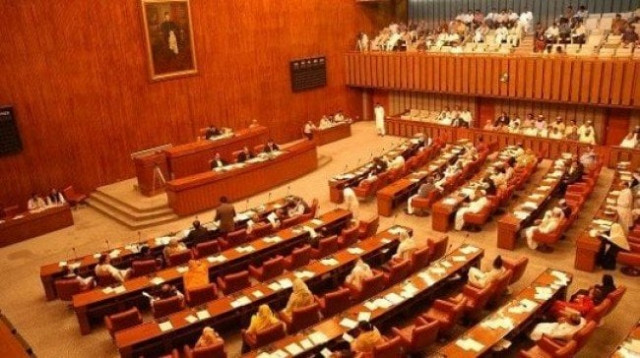The number game: Which voting system will prevail in Senate polls 2021?
PTI govt wants show of hands against cries of horse trading

In a build-up to the Senate election in February 2021, the opposition is in a political fix as it finds the government’s insistence to change the electoral method strikingly odd.
Interestingly, the devil does not lie in the government’s persistence but rather in the method of choice as most of the people are not familiar with the workings of the Senate’s current electoral system.
The two most viable options being mulled over for 2021 polls are the show of hands and the open ballot system.
So far, the elections have been held through the secret preferential ballot under the single transferable vote system. In the past polls, almost every political party has decried “horse trading” with the most notable instance in March 2018, during the election of chairman Senate.
The ruling PTI has been urging to hold the Senate polls by the show of hands for a long time.
In 2015, PTI Chief Imran Khan asked political parties to support him in demand for the show of hands method to stop alleged horse trading.
Currently, President Dr Arif Alvi has sought the advice of Supreme Court in the matter, whereas, the cabinet has also decided to hold the Senate polls in February 2021, instead of March.
What is show of hands method?
The show of hands is an alternative to the secret ballot voting, which is practiced in several countries.
In this method, the voters raise their hands to be counted. In Pakistan, the method is in practice during the elections to vote in a prime minister and chief ministers.
Open ballot
In contrast to the secret ballot, a voter's choices are not confidential as before inserting the ballot paper into the box, every voter has to show his marked ballot paper to the authorised representative of his party and any refusal on his part would render his ballot paper liable to rejection.
The open ballot system has been adopted by India for the Rajya Sabha polls.
Single transferable vote
The single transferable vote was initially used in the elections for the first constituent assembly of Pakistan and has been in practice since 1973. Under this system, every voter has only one vote, in which he prioritises his choices in a sequence against the names of the candidates.
A quota calculated by the Election Commission of Pakistan then determines how many votes each candidate needs to be elected.
This system takes into account not only a voter’s first choice, but also his subsequent preferences. The surplus votes are distributed amongst other candidates in accordance with the preferences expressed by voters.
Quota in Senate
The Senate comprises 104 lawmakers; 23 from each province, eight from erstwhile FATA and four from the federal capital. The 23 seats apportioned to a province comprise 14 general seats, four reserved seats each for women, and technocrats/Ulema, and one for minority.
Likewise, four seats Islamabad comprise two general seats, one reserved for technocrats/Ulema and one for women. The upcoming Senate will comprise 98 members, as there will be no elections on the four vacant seats from FATA after its merger with KP.
Senators are elected for a term of six years, but not at the same time, as 52 senators (one-half) are elected one time and the other half, three years later. In 2021, 52 senators are retiring, but the election will be held on 48 seats because the four seats of FATA will not be included now.
Each provincial assembly will elect seven senators on the general seats, two each on technocrat and women seats, forming a total of 11 seats.


















COMMENTS
Comments are moderated and generally will be posted if they are on-topic and not abusive.
For more information, please see our Comments FAQ